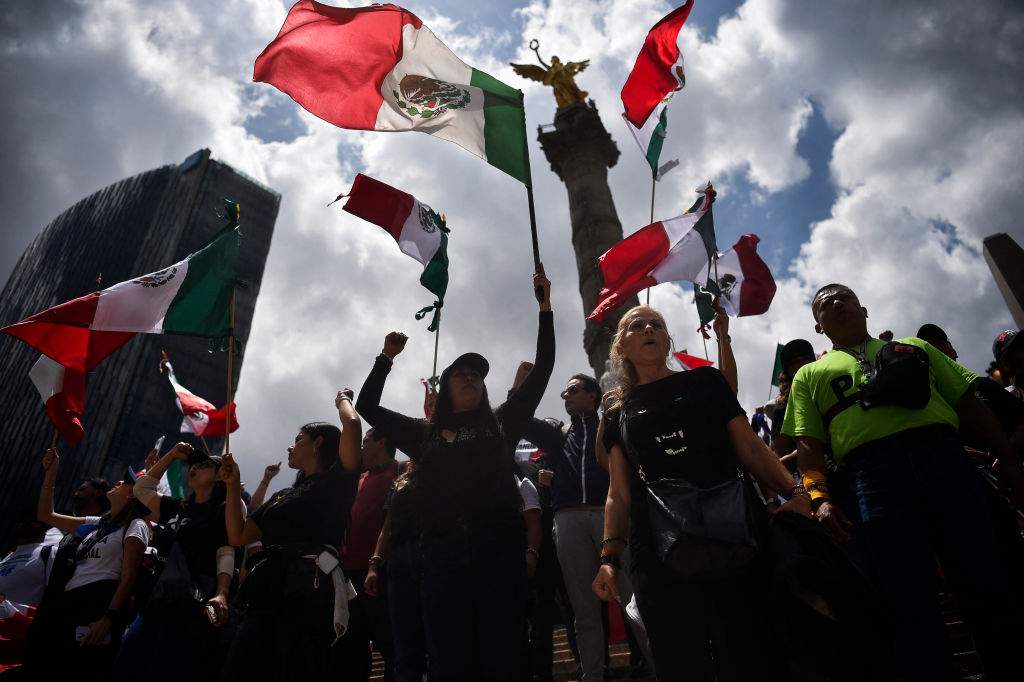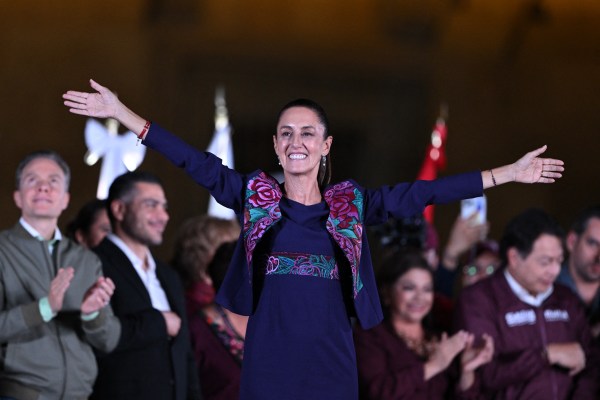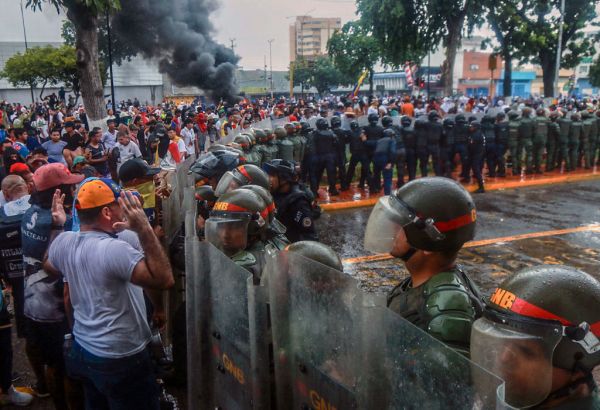Happy Wednesday! Here at The Dispatch, we’re dedicated to cultivating the next generation of conservative thinkers and leaders—that’s why we’ve partnered with several student organizations to provide their members with access to all The Dispatch has to offer.
At a time when about a third of Americans under 30 say they get their news from TikTok, you can help us in our goal to equip more young people with the tools they need to stay informed, think critically, and engage in meaningful discussions by sponsoring a student membership today. And if there’s a student group you think would be a good fit for the program, please email members@thedispatch.com.
Quick Hits: Today’s Top Stories
- At least nine people were killed—including an 8-year-old girl—and more than 2,700 others were injured on Tuesday after thousands of pager communication devices belonging to members of Iran-backed terror organization Hezbollah exploded almost simultaneously. A U.S. official told the Associated Press that the Israeli government, which hasn’t claimed responsibility for the apparent attack, briefed the Biden administration on the operation after it concluded. According to a New York Times report, Israeli operatives likely hid small amounts of explosive material in pagers recently imported to Lebanon from Taiwan. The Iranian ambassador to Lebanon, Mojtaba Amani, was reportedly among the injured. Hezbollah vowed to retaliate for what one of the group’s officials described as its “biggest security breach” ever.
- Lawyers representing TikTok and its Chinese parent company, ByteDance, appeared in federal court on Monday to present their case challenging a U.S. law that could lead to a national ban on the popular video-based social media platform. The company’s legal team contended that a TikTok ban would violate the First Amendment—stripping the free speech rights of the company and the platform’s users—and compared the prospective ban to a theoretical ban on the written works of 19th-century French author Alexis de Tocqueville. However, at least two of the three federal judges did not appear to be persuaded by TikTok’s arguments.
- Meta—the parent company of Facebook, Instagram, WhatsApp, and Threads—announced on Tuesday a global ban on RT, the Russian-state media outlet formerly known as Russia Today, on all of its platforms. The decision—which Meta said was prompted by “foreign interference activity”—comes less than a week after the Biden administration placed further sanctions on individuals and groups associated with RT, and alleged the state-founded media group engages in “covert influence activities.” Earlier this month, the Justice Department indicted two RT employees for allegedly participating in a Russian influence operation that funneled almost $10 million to a right-wing U.S. media company. (Disclosure: The Dispatch is a participant in Meta’s fact-checking program.)
- Meanwhile, Meta’s Instagram on Tuesday introduced new measures for users under the age of 18—called Instagram Teen Accounts—aimed at offering in-app privacy protections, including making accounts private by default, issuing time limit reminders after one hour of app use, a “sleep mode” that mutes notifications at night, restrictions on viewing sensitive content, and limits on interactions with users not followed by the account owner. All Instagram accounts with listed ages younger than 18 will automatically transition into a “Teen Account,” which can be reversed manually but requires parental permission if the user is listed as under 16 years old.
- Republican Ohio Gov. Mike DeWine said on Monday that a number of the bomb threats on schools and other public buildings in Springfield, Ohio, hailed from outside the United States. Several originated from one foreign country in particular, he added, though he did not identify that country. More than 33 bomb threats have been made in the city in recent days, including against schools, hospitals, Springfield’s city hall, and other government buildings, prompting the evacuation of at least two elementary schools. “None of these [threats] had any validity at all,” DeWine added. Nonetheless, DeWine also announced on Monday he was deploying Ohio state troopers to 17 different school buildings in the city due to the continued threats.
- The Federal Aviation Administration (FAA) said Tuesday it intends to issue three civil penalties to Elon Musk’s space exploration company, SpaceX, for alleged violations of federal safety regulations. The FAA proposed fines totaling up to more than $630,000, specifically identifying three instances of violations in two separate 2023 launches: SpaceX allegedly changed the launch control room location and removed a preliminary readiness poll two hours before scheduled takeoff without FAA approval, and, during a separate launch, used rocket fuel from an FAA unapproved source. The company has 30 days to respond to the agency, and Musk tweeted Tuesday that SpaceX plans to file a countersuit against the FAA, accusing the federal oversight agency of “regulatory overreach.”
- Federal prosecutors on Tuesday charged hip-hop musician and rapper Sean Combs—also known by the stage name “Diddy”—in a three-count indictment, including charges of engaging in sex trafficking by force, fraud, or coercion; racketeering conspiracy; and transportation to engage in prostitution. Federal prosecutors alleged that the music mogul—who was arrested Monday night—had subjected women and others to abusive behavior for almost two decades, including drugging them and engaging in financial and physical intimidation. “To do so, Combs relied on the employees, resources, and influence of the multi-faceted business empire that he led and controlled—creating a criminal enterprise whose members and associates engaged in and attempted to engage in, among other crimes, sex trafficking, forced labor, kidnapping, arson, bribery, and obstruction of justice,” prosecutors wrote in the 14-page indictment. Combs made his first appearance in federal court on Tuesday, pleading not guilty.
AMLO’s Last Play

Earlier this summer, we wrote to you about the Mexican presidential election, which saw Claudia Sheinbaum—a leader in the ruling Morena party—break the glass ceiling by securing the presidency in a landslide victory.
But looming over her candidacy and, indeed, latent presidency was a big question mark: How much would she depart from the agenda of her predecessor and mentor, Mexican President Andrés Manuel López Obrador (AMLO)—especially regarding a package of highly contested constitutional and judicial reforms AMLO introduced in February? Perhaps the real question is: How much distance might AMLO tolerate?
Sheinbaum had endorsed the reforms as a candidate, and enacting them would have marked her first major test as president after her inauguration, set to take place at the beginning of October. Due to a quirk in the timing of presidents’ swearing-in, the newly elected Congress took office on September 1, a month before Sheinbaum’s own inauguration.
AMLO had previously hinted he might hold off on instituting the overhaul while he was in the lame-duck period but—armed with functional supermajorities in the lower Chamber of Deputies and the Senate, thanks to opposition defections—instead moved to push the reforms through. The necessary majority of Mexican state legislatures subsequently approved the changes—Morena controls most state governments—which formally went into effect on Sunday.
Domestic critics and international observers have argued the overhaul will undermine the rule of law and key civil institutions, potentially putting the country on a path back toward the corrupt, one-party rule that dominated Mexico for most of the twentieth century.
What exactly are these reforms, and why are they so contentious? At the heart of the changes are measures introducing the direct election of judges at the state and federal level—including the Supreme Court. Currently, the Federal Judicial Council appoints federal judges and magistrates relying in part on a professionalized exam system, while the president nominates Supreme Court justices that the Senate confirms for 15-year terms. State and local judges and magistrates are selected by state legislatures or local councils.
Now, some 1,600 federal judges will resign: Most will be replaced in elections next June, and the rest in 2027, when state judges and magistrates—approximately 5,000—will also all be up for election. The measure shrinks the Supreme Court from 11 justices to nine and, instead of staggering the transition, all nine will be up for reelection in June—giving Morena the opportunity to put forward candidates that could sweep control of the court. Absent the reforms, Sheinbaum would have only been able to nominate three justices.
Such direct election of judges and justices could compromise judicial independence and autonomy. “Popular direct election of judges is a major risk to the functioning of Mexico’s democracy,” Ken Salazar, the U.S. ambassador to Mexico and former Colorado attorney general, said in a statement last month that prompted the Mexican government to temporarily pause communications with the embassy of its closest partner.
“The damage that this reform will mean for the country is incalculable,” argued opposition Sen. Luis Donaldo Colosio Riojas. Stanford Law School scholars—along with representatives of the Mexican Bar Association and the Inter-American Dialogue think tank—concluded that overhaul would compromise “the foundation of the rule of law in Mexico.”
Proponents of the reforms argue that the elections will inject some much-needed popular accountability into a sclerotic judiciary that has struggled with outright corruption, particularly at the local level, and nepotism and graft at the federal level. “Abraham Lincoln defined it like this: ‘Democracy is government of the people, by the people, for the people,’” Sheinbaum tweeted earlier this month. “The president is elected by the people, the legislature is elected by the people. If judges, magistrates and ministers are elected by the people, where is the authoritarianism?”
But elections may not solve the corruption issues. “While the Mexican judiciary is in dire need of reform, it is not clear that the popular election of judges is the best way to address its shortcomings,” argued Gustavo Flores-Macias, a public policy professor at Cornell University whose research focuses on Latin America. “There is little evidence from international experiences that elected judges are less corrupt or less prone to serve special interests than non-elected ones.”
If electing judges is a questionable practice generally, the speed of Mexico’s transition poses some unique problems. State governments have yet to sort out the exact details for their elections, but regardless, voters will be deciding on thousands of judicial candidates across the country in a single election for the first time. In Mexico City, for example, voters could have to choose from among 1,000 candidates for 150 judicial positions: Just filling out a ballot could potentially take up to 45 minutes, according to one estimate. Governance scholars argue that instead of giving people an effective voice in selecting their judges—something that is done at the local level in states throughout the U.S.—the large number of positions will overwhelm voters and could contribute to low voter participation.
Beyond the elections, the reforms also created a new judicial disciplinary tribunal. The body, made up of five members elected by popular vote on the same schedule as presidential elections, will have the power to sanction members of the judiciary, including Supreme Court justices, with no process for appeal.
The reforms are part of AMLO’s efforts to accumulate state power in the executive branch and expand his party’s authority. As we explained in June:
AMLO came into power promising a “Fourth Transformation” of Mexico—a government agenda he defined as on par with transformational events in Mexico’s history, such as Mexican independence from Spain in the early 19th century. Blending old-school leftist ideology with populism and a cult of personality, AMLO pushed the government in a more statist direction and away from what he described as a “neoliberal model” that he argued perpetuated corruption and social and economic inequality. He significantly expanded the government’s role in the energy sector, boosting state-owned enterprises over their private competitors, and initiated huge public works projects. He also reimagined Mexico’s social welfare system, raising the minimum wage and universalizing federal pensions.
The federal judiciary and the Supreme Court had emerged as a foil to pieces of AMLO’s agenda, shooting down many of his attempts to remake the government and consolidate executive power. Hence the judicial reforms, which he described as “Plan C”—after “Plans A” and “B”—were partly blocked by the courts.
The judicial overhaul, combined with Morena’s expanding power and influence, holds echoes of an era—the better part of a century—when the Institutional Revolutionary Party (PRI) dominated all three branches of the Mexican government. One writer famously described PRI rule as “the perfect dictatorship.”
“Candidates competing in judicial elections over the next two years will have little chance of success without Morena’s endorsement, which means Mexico will probably be left with a political-judicial monoculture,” argued Quico Toro, a journalist covering Latin America. “Morena congressmen making laws for a Morena president to execute and Morena judges to arbitrate.”
Indeed, some of the new changes appear intentionally structured to achieve that end. “Candidates for judicial postings will have to submit applications and be nominated to run in an election by evaluation committees within the executive, legislative, and judicial branches, all of which are controlled by the governing party,” Lila Abed, acting director of the Mexico Institute at the Wilson Center, explained last week.
The imminent Senate approval of the reforms earlier this month sparked large-scale protests in Mexico City and a judicial strike. Thousands of protesters, including judicial workers and law students, took to the streets of Mexico City, with hundreds storming the Mexican Senate last Tuesday to interrupt the vote on the overhaul. The protesters chanted, “The judiciary will not fall.”
The Senate recessed but nevertheless reconvened and passed the reforms early Wednesday morning, ultimately setting the stage for the measures’ final passage.
Worth Your Time
- Prompted by a discovery made while cleaning his office, Neal B. Freeman recalled his two-decade journey to privatize an international communications company, Intelsat Ltd., that was set in motion by a documentary about Maggie Thatcher that made its way to then-President Ronald Reagan. “What neither the Great Communicator nor his aides had bothered to tell me, however, was that Intelsat was not a commercial organization governed by contract,” Freeman wrote in National Review. “Its bylaws stated clearly that any material change in the organization would require the unanimous approval of the treaty signatories, all of which were sovereign nations. I don’t know whether you have ever tried to persuade 146 sovereign nations to agree on a risky and consequential reform, but it can take some time. In my case, it took 20 years.”
- The rioters who attacked the U.S. Capitol on January 6, 2021, targeted Democratic and Republican lawmakers alike. However, “if you ask Republicans in the House and Senate whether they’re concerned at all that Donald Trump is laying the groundwork to once again claim mass voter fraud, many will hardly entertain the idea,” Haley Byrd Wilt reported for NOTUS. “For Rep. Brian Mast [of Florida], any unease about how he might react if he loses is inconceivable—Trump won’t have to complain about the election results for a simple reason: ‘He’s going to win,’” Mast told Wilt. “But if you ask Mast if Trump should have done anything differently, his answer is immediate: ‘No.’ … At this point, most GOP lawmakers are likewise more than comfortable siding with Trump and downplaying the violence of Jan. 6. And if you ask congressional Republicans about Trump’s ongoing allegations of election fraud—or if they’ll vote to certify this year’s results—you’ll get a lot of lukewarm shrugs and noncommittal word salad.”
Presented Without Comment
ABC News 6: Vivek Ramaswamy Announces Town Hall Event in Springfield
Also Presented Without Comment
Mediaite: Sarah Huckabee Sanders Swipes at [Kamala] Harris for Not Having Biological Kids
So, my kids keep me humble. Unfortunately, Kamala Harris doesn’t have anything keeping her humble.
In the Zeitgeist
Looks like it’s time for another career-defining performance from Cillian Murphy! The only question now is what light-hearted romp of a film it’ll be packaged with.
Toeing the Company Line
- In the newsletters: The Dispatch Politics crew checked in on the Senate race in Texas and Nick pondered whether there is a double standard for political incitement to violence.
- On the podcasts: Kevin joins Jonah on The Remnant to discuss his latest essay on the controversy over Haitian immigrants in Springfield, Ohio, and Kevin’s claim that J.D. Vance is the “most despicable human being in public life.”
- On the site: Jonah weighs in against what he describes as Trump’s “cynical hypocrisy on extreme rhetoric.”
Let Us Know
Do you think Mexico’s reforms are a harbinger of democratic backsliding or a net win for democracy in Mexico? Neither?












Please note that we at The Dispatch hold ourselves, our work, and our commenters to a higher standard than other places on the internet. We welcome comments that foster genuine debate or discussion—including comments critical of us or our work—but responses that include ad hominem attacks on fellow Dispatch members or are intended to stoke fear and anger may be moderated.
With your membership, you only have the ability to comment on The Morning Dispatch articles. Consider upgrading to join the conversation everywhere.